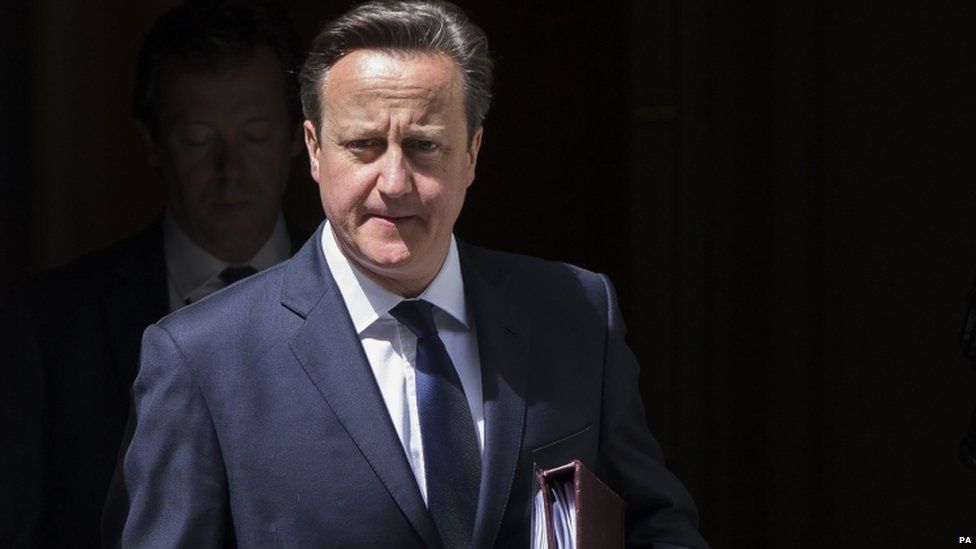EU referendum: Cameron to make case for reform in Hamburg speech
- Published

David Cameron is to spell out his case for reforming the EU as he prepares for next week's crunch summit in Brussels.
He is expected to use a speech in Hamburg, Germany, to set out the "wider agenda" behind his renegotiation of Britain's EU membership.
It is his final major speech before next week's meeting of EU leaders where he hopes to secure agreement for the renegotiation of the UK's membership.
It comes as 130 Tory councillors urged him to admit his EU talks had failed.
The prime minister. who spoke to his Spanish counterpart Mariano Rajoy on the phone before leaving for Germany, is keen to get a final deal in place in time for him to put the new terms of membership to the British public in a referendum in June.
Speaking in Brussels ahead of a meeting of EU finance ministers, Chancellor George Osborne said there was a "real prospect" of reaching an agreement next week.
But his French counterpart Michael Sapin warned that nothing in the deal could stand in the way of further eurozone integration or confer special status on a particular industry, such as financial services.
The UK is seeking legal protection for the City of London from new regulations that would apply across the whole of the EU, including non-eurozone countries.
'Case for action'
The BBC's Brussels correspondent Ben Wright said Angela Merkel, who will speak to Mr Cameron later, had been advising him on what is and isn't possible in his renegotiation while making it clear she wants a settlement that keeps Britain in the EU.
Downing Street said Friday's visit, including the speech at 21.00 GMT would be about "setting out the case, talking through the proposals, talking about where we are, reminding people of some of the reasons why we are taking this course of action".
Donald Tusk, the European Council president who is brokering the talks on the UK's renegotiation process, has warned that the political process remains "very fragile", with some leaders still harbouring reservations about the plan, particularly over limits on welfare payments to new EU migrants.
He has cleared his diary in order to hold talks with some of the sceptics - said to include French president Francois Hollande, Greek prime minister Alexis Tsipras, Romanian president Klaus Iohannis and Czech premier Bohuslav Sobotka - ahead of the summit.
Negotiations on the final wording of the deal - which includes an "emergency brake" on benefit payments to EU migrants and a UK opt-out from "ever closer union" - look set to carry on right up to the summit.
'No veto'
Mr Osborne said getting "the right relationship" between countries that use the single currency and those outside the eurozone, such as the UK, was vital for boosting financial stability across Europe and further afield.
"Getting this all right is absolutely essential to make sure we protect the citizens of the EU and of course, from my point of view, protect the citizens of Britain," he said.
Mr Sapin said there would be a "dialogue" over the UK's desired changes in this area but some fundamental principles could not sacrificed.
"Economic and monetary union is going to get deeper - must get deeper. There can't be a veto, no mechanism that will slow down this deepening of the economic and monetary union," he said.
And he said the foundations of the single market had to be protected.
"It's the same everywhere - across the whole territory of 28 (members) - whatever the product, but particularly when it comes to financial products.
"We don't want any clashes, nothing to jeopardise this single financial market. The legislation may be different, but the effect must be the same across the whole European territory."
Conservative MP Mark Field, whose constituency includes the City of London, said there was a "tussle" going on over the status of Europe's largest financial centre within a changing EU and that while the City would still prosper if the UK left, most senior figures there wanted the UK to remain.
Further reading on the UK's EU referendum
EU renegotiation: Did Cameron get what he wanted?
Referendum timeline: What will happen when?
The view from Europe: What's in it for the others?
More than 130 Conservative councillors have warned the prime minister risks splitting the party unless he accepts his renegotiation has failed and he campaigns for Britain to leave the EU.
"You made clear that if you did not get the deal you wanted in Europe you would not rule out campaigning for Britain to leave the European Union yourself, and we hope you will now unite your party and Britain in doing so," they wrote in a letter to the Daily Telegraph.
Former shadow chancellor Ed Balls told the BBC that the economic and migration challenges which have beset Europe in recent years had been a "disaster" for the EU's standing in the UK and he expected a gradual erosion of the core principle of freedom of movement in the future.
But the Labour politician told Radio 4's Today he backed David Cameron's argument that "British influence can be used to make real change in Europe".
- Published10 February 2016
- Published30 December 2020
- Published11 February 2016